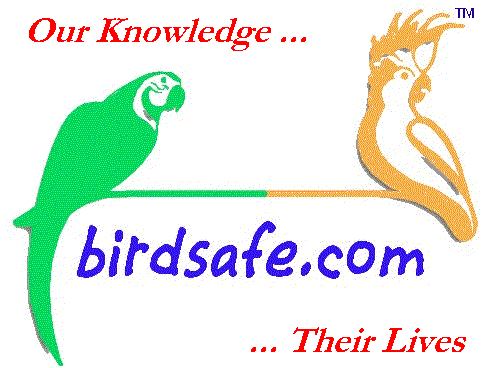


Story Bird: Sinbad
The Last Twelve Hours
Sinbad, Female Congo African Grey Age 4 years 7 months
9:30 p.m. Friday, September 28, 2001
Sinbad stood on her cage door with feathers fluffed on her chest and tight around her lower body. I was shocked to see that her lower body looked skeletal. She tried to bite as I reached for her. That was very unusual behavior. When she finally allowed me to probe, I knew she had an impacted crop. I reached for an avian medical book and I read what to do for an impacted crop. She relished the warm water, but would not allow me to massage her crop. I knew I had to get her to a vet immediately. I found many emergency rooms open, but none staffed with an avian vet. I made Sinbad comfortable and prayed that she make it through the night.
10:00 p.m.
Sinbad was on her usual perch. Her body was in a hunkered down position. She did not seem in distress. She was grinding her beak.
2:00 a.m. Saturday, September 29, 2001
She was still on her usual perch, and looked fine. She said, "Hello." Had I known what was ahead, I would never have left her alone.
8:00 a.m.
I located an avian vet and went to get Sinbad. My heart sank when I found she had regurgitated and was on the floor of her cage. I wrapped her in a towel, put her into the travel cage, and drove at breakneck speed. I kept telling Sinbad to hold on. I realized that the panic in my voice was not helping, so I began speaking normally saying familiar things, "I love you. It's ok. I love you." She waddled to the front of the cage where we had eye contact. I noticed that she used her wings for balanced as she tried to walk to where she could see me. She hung her beak from a cage rung. I presume for balance.
Several times during the trip, I heard her in distress. I cannot describe what I heard, but I knew it was distress. I knew I had to hurry to get help for her.
I ran into the clinic with Sinbad wrapped in a towel. Without any concern whatsoever for the customers standing at the counter, I blurted out, "Please, she's dying!" (I do not know why I said that.) I was ushered to an examination room. I heard the doctor tell someone in the next room, "I'm sorry, I have an emergency!" She was in our room in the next instant.
8:30 a.m.
I unwrapped Sinbad, the doctor placed her hands on Sinbad and said, "I'm sorry, I can't save this bird." I recall that I grabbed her wrist and said, "You don't understand. This is not just a bird!" The doctor called for instruments and various techs rushed in with whatever she called for. Sinbad began regurgitating again. The vet worked to clear Sinbad's airway. She was standing opposite me as we cradled Sinbad on the table between us. The vet worked expertly.
8:45 a.m.
I kept talking to Sinbad the entire time. Suddenly, the doctor placed her hands over mine and said, "I'm so sorry. I'm so sorry." I burst into tears. I remember asking, "Are you sure? Are you sure? Isn't there anything you can do? Are you sure?" Sinbad was unconscious. I held my beautiful sweet Sinbad in my hands and with my face pressing against her soft body she died. She just slipped away. I could not believe that the precious bird that I loved so dearly was gone. Despite the work done to save her, her feathers were unruffled. She was so soft, so beautiful and so very still. I wanted her to move. I wanted her to fight. How could she look so beautiful and not wake up. It was a horrible heart-wrenching moment. Everyone left the room except the doctor who kept talking to me. In due time, she asked if she could come back in a few moments to ask me some questions.
I grieved alone in that exam room. I held Sinbad, I kissed her, and I stroked every part of her body. I asked for her forgiveness. (I thought I caused her impacted crop.) I cried for all the sweet things my Sinbad had said, and I cried because I did not know that her "Hello" at 2 a.m. that morning was to be the last word I would ever hear her say. I wrapped and unwrapped her so many times that morning. I needed to be sure that she was not breathing. Could the doctor have been wrong? I took in the sweet smell of her and I took deep breaths so that I could cherish her sweet scent always. I wrapped her again for the last time and placed her on the table but still with my arms around her.
I answered numerous questions. I saw the look on the doctor's face when I responded that I had four parrots at home. She asked for the species and by the time I had gotten to the third bird she sighed and whispered, "Oh no." I do not think I was meant to hear that, but even though I did hear her, I did not grasp the seriousness of her reaction.
The first indication that the doctor suspected Proventricular Dilation Disease (PDD) was after discussing the necropsy. It was then that the significance of her earlier comment struck me – PDD. My four remaining parrots were exposed! The thought of a necropsy on her body was appalling, but we needed to know what happened to her. The doctor explained in detail what she would do, and hard though it was, I agreed that it needed to be done. I recall that I had to let go of Sinbad so they could weigh her. She was handed back to me.
One of the hardest things that morning was actually placing my beautiful Sinbad into the hands of a strange person knowing that I would never again hold her or kiss her sweet head. As I placed Sinbad on the outstreatched hands of the technician, I told her that she had no idea how smart and sweet this beautiful parrot was. She whispered, "I'm sorry" turned and walked out of the room taking with her a piece of my heart.
The Next Week
Confirmation of PDD came several days later. I received a three-page report and each word tore my heart. How could Sinbad have been so sick? The question humbles me. PDD ravaged vital organs – nothing was spared from its vile quest to attack and kill. Sinbad's affected organs were the liver, kidney, lungs, esophagus, crop and gizzard. PDD is insidious—awaiting a chance to entrap; treacherous; harmful but enticing; having a gradual and cumulative effect; subtle; developing so gradually as to be well established before becoming apparent. Those are the words the dictionary uses to define insidious; those are the words that define PDD!
In retrospect, there were subtle signs. A week prior I suspected Sinbad was becoming phobic. She seemed to stare wide-eyed. She seemed fearful when in her usual position (shown in the accompanying photo). It began to worry me to the point that I asked Jane Hallander for a consultation. A few days before the consult, however, I noticed that the object of Sinbad's wide-eyed stare was a printer. (I had placed it on the floor a week earlier.) I removed the printer and her wide-eyed stare disappeared. Jane and I decided to postpone the consult. (Canceling the consultation is something I regret, because I suspect Jane might have sensed Sinbad's illness.) Jane continues to reassure me. Another unusual action was that each time I placed Sinbad into her cage, she would step onto her perch, but would hold tightly to my finger with her other foot. Sinbad would not let me go, and I still wonder why.
Another mildly noticeable behavior was that Sinbad acted like an egg-laying Cockatiel. She would squat, fluff, and rock back and forth, then perk up and run to one side of her play top. She had a slightly diminished appetite, and she did not scramble as quickly to her food bowl at feeding times. She seemed a bit nippy. There was a rapid weight loss at the end. Sinbad was not a large Grey, often varying in weight from 422 to 438. (At death, she weighed 430g.) Again, not unusual for Sinbad, but these were all signs nonetheless. Sinbad had none of the typical PDD indicators—passing whole seed, or undigested food, regurgitation, which Sinbad began only 45 minutes before her death.
PDD is contagious and fatal. I have four at-risk parrots now whose lives may be snuffed by PDD. I am consumed with grief over Sinbad's death and at the thought of losing four more parrots one-by-one. I am making every effort to educate myself, so that I can protect my remaining parrots. I do not want their little bodies to weaken and allow PDD to gain a foothold and squeeze the life from them. I will do whatever it takes to fight this disease. I will contribute to fund-raising campaigns and I will talk about the ravages of PDD to anyone who can offer their help to the cause, or who needs help. I encourage everyone to support the research of Dr. Branson Ritchie and others to find a cure for PDD. I was the perfect bird mom, my parrots were untouchable, and my parrots had the best environment. PDD strikes other birds. One sunny morning, on September 29, 2001, I was humbled. In just twelve short hours, my "perfect" world shattered. This world lost a beautiful, smart, and ever so sweet Grey named Sinbad.
Ginny Bender dbender2@earthlink.net Max, Blue Crown Conure Jade, Maxmillian Pionus Bobo, Lilac Crown Amazon Tres Jolie, Blue Front AmazonLinks for PDD:
http://parrotplay.com/articles/BransonRitchiePDDupdate.htm
http://www.vet.uga.edu/ivcvm/1998/gregory/gregory.htm